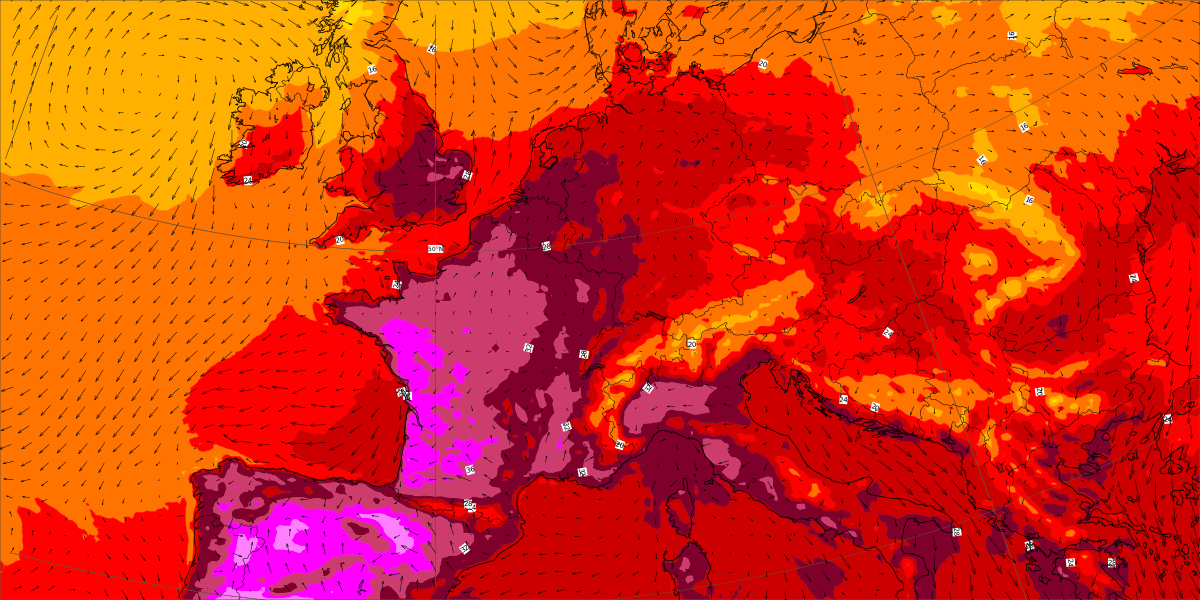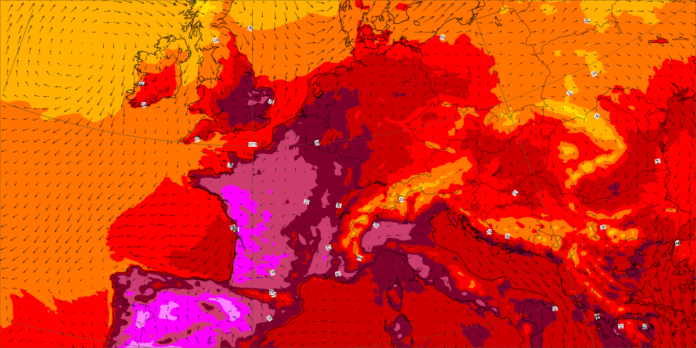[ad_1]

Government officials are meeting regularly to assess the impact of the heatwave blasting Britain, and have not ruled out that the first-ever national heatwave emergency could be declared.
The UK Health Security Agency has issued health alerts across the majority of the country already, including guidance for schools and hospitals and the Met Office has extended an amber heat warning for “exceptionally high” temperatures until Monday.
Vulnerable groups, such as the elderly, have been warned to take care, while there have been reports of train tracks catching fire, reservoir water levels hitting record lows, and hospitals under pressure.
Forecasters have said it was possible temperatures could reach 40C later this week, which would break the record for the UK’s hottest day.
Below we look at what it would mean if a major national incident is declared.
The Met Office has issued a two day extreme heat alert
(Met Office)
What is a national heatwave emergency?
A national emergency is declared when a heatwave is so severe and, or prolonged that its impacts extend beyond the health sector, according to the UK Health Security Agency (UKHSA).
Transport, food and businesses could also be affected and it could cause power or water shortages, according to the agency whose job it is to protect the population from health threats.
A national emergency could also be declared when the “integrity of the health and social care systems is threatened”, it added.
The UKHSA said at this level – known as level four on its alert system – “illness and death may occur among the fit and healthy”, as well as among the most vulnerable groups.
It is the only alert level not defined by temperature thresholds but by societal challenges.
A national heatwave emergency has never been declared since the government’s heatwave plan for England was first published nearly two decades ago, following a devastating heatwave in 2003.
The UK isn’t the only country facing extreme heat this summer
(2022 European Centre for Medium-Range Weather Forecasts (ECMWF))
What risks do the government anticipate if national emergency is declared?
Transport
Risks include road surfaces melting due to direct sunlight and rail tracks warping or buckling.
Traffic congestion leading to delays on motorways could have potentially serious consequences for those stranded in vehicles, while extreme temperatures on the London underground could lead to a “range of health and safety challenges”, it added.
The heat in London caused train tracks to catch fire on Monday
(Network Rail)
Power
The heatwave plan for England warns that there could be power shortages as rising temperatures increase energy demand to power air-con and fans at a time when energy companies traditionally maintain power stations for the winter.
High temperatures can also cause cooling problems for power stations and lower their efficiency.
The Department for Business said it was working across the government to assess and mitigate the impact of the heatwave on power. “We will continue to monitor the situation and ensure necessary steps are taken to protect people.”
Environment
Heatwaves can cause higher concentrations of nitrogen dioxide, as well as increased ozone levels, the agency warned. While prolonged sunshine can accelerate the growth of blue-green algae, causing problems for fish, and swimmers.
The risk of wildfires can also increase, while animals may also be at risk from the extreme weather, it said.
The heatwave plan warned that crops can also be sensitive to rising temperatures and may die as a consequence.
People in Portugal have been forced to flee fires in the last week as temperatures are set to top 40C
(EPA)
Water
In the event of a reduced mains supply, water companies would introduce water-saving measures such as reducing water pressure or limiting 24/7 supply.
In the event of a loss of mains supply, water companies must supply water by alternative means, such as in static tanks or bottled water.
An Environment Agency spokesperson said it was working with water companies to monitor resources, adding: “We can all do our part to use water wisely, reduce our usage and manage this precious resource,” a spokesperson said.
A heat haze shimmers over the Mersey estuary as the Coastguard rescue a man and a woman trapped in mud on Crosby Beach on Monday
(Getty)
Schools
The plan warns that schools may have to close classrooms when conditions are too hot.
A Department for Education spokesperson said there was clear government guidance available online to help school staff look after children in the hot weather, including the use of ventilation, keeping children hydrated, and avoiding vigorous physical activity for pupils.
“Individual school leaders are responsible for managing their own local circumstances, but we are not expecting nor advising schools to close, and as always will continue working with local authorities to support schools and pupils,” the spokesperson said.
What will the government response be?
The UKHSA says the decision to declare a major incident will be made by the Cabinet Office.
It will consult with government departments and then nominate staff to coordinate the central government response – likely, in this case, to be the Department of Health because a prolonged heatwave would primarily be a public health issue.
Relevant departments will deal with other challenges, such as power failures or transport disruption if they arise, it added. If they become the primary concern then the lead government department might change.
Health care system
The health care system will continue as it has been doing unless advised otherwise.
For health and social care commissioners that means putting out alerts about how to keep cool, reviewing the safety of public events and supporting organisations to reduce unnecessary travel.
For healthcare providers, that includes visiting or phoning high-risk people. Care homes and hospitals are advised to activate plans to cope with a possible surge in demand, check indoor temperatures are recorded regularly and ensure staff can help clients find access to cool rooms.
NHS England and other health agencies would implement a national emergency response.
Families cool off in the River Darent in Eynsford on Tuesday
(Getty)
Transport
If temperatures do not fall below 24C for three days in a row, the London Underground Network would deploy hot weather notices and bottled water supply, as well as measures to prevent track buckling.
Network Rail speed restrictions are already in place across parts of the network to reduce any warping and said its extreme weather action teams will monitor trackside temperatures and respond to buckled rails or damaged overhead lines.
National Highways said it would not send gritters out in the hot weather as its road surfaces can withstand extremes of temperature including hot weather.
[ad_2]
Source link















